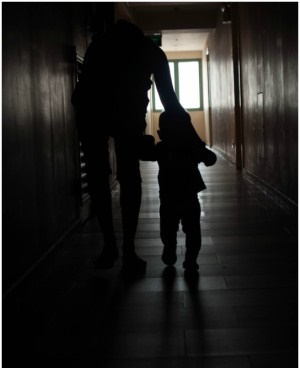
With April being Autism Month, Karen Venter* (47) from the Breede River Valley wants to draw attention to the fact not all people with autism are the same – each is a “unique and interesting person”.
Karen’s 12-year-old daughter, Christelle*, believes in a magical realm where she transforms into Queen Wolf.
“I wish I could join her in that world. As a mom I want to experience parts of it the way she feels it,” Karen says.
But don’t refer to her child as “special”.
“It’s a plastic word,” she says. “A mom from Pretoria who moved here recently views her daughter as a little princess and my child as special.
“Of course your child wants to be special to you, but Christelle does things differently. There’s no need to pity her.
“When their child accomplishes something I don’t want to beat around the bush about my daughter. I don’t want to stick frills and bows to it and sugar-coat it. Sometimes everything in life is just sour.
“People need to be careful with empathy. Don’t pretend she doesn’t exist. Talk to her and not about her. She wants to know what you have to say about her.”
There’s an 11-year-old autistic boy in the neighbourhood too. “He had a meltdown. He struggles to communicate and bit his mother until she bled. Once he calmed down he could explain, and said, ‘I’m so tired of not being able to use my voice to be heard.’
“I’m grateful that my child can talk. I know what’s in her heart and I can give her the help she needs. The child needs to feel safe. She gets angry if she can’t read a situation. The good Lord gave her the talent of being able to discern who’s true and who’s not. She knows when someone’s false. She can read emotions and knows what you’re thinking about her. If you’re astounded by her, she knows it.”
When Christelle was born, on 23 May 2005, everything was “fine” even though she was three weeks premature. “She didn’t even have colic or allergies,” Karen recalls.
“At six weeks she needed an emergency operation to fix a hernia.
“My pregnancy was normal. There were never any alarm bells. My appetite was normal and I developed a sweet tooth. I never felt nauseous or was overcome with heartburn.
“Three months in I became swollen because of water retention. I was on antidepressants at the time but my psychiatrist assured me it was safe. But my gynaecologist said he was uncertain about side effects and suggested I don’t take them in the first trimester. I had to wean myself off them to ensure I didn’t suffer withdrawal symptoms.”
During her pregnancy she visited Rio de Janeiro, Brazil, and Buenos Aires, Argentina, with her husband and they had to get yellow fever vaccinations. “I did everything by the book. No alcohol and no seafood. I also didn’t sleep on my back.”
Karen says she never imagined that someday she’d be able to parent a child with unique needs. “I didn’t know anything about autism. Characters on TV like Mr Bean freaked me out. Something about him scared me. I also avoided children with Down syndrome. But that was long before I got married in my thirties.”
Before becoming a mom she was a personnel officer. “I studied psychology at a time when I didn’t know what I wanted to do with my life,” she says, adding it’s not a career choice she was keen on.
They live in a small town in the Breede River Valley which is why she’d prefer not to use her real name. People and children in small communities can sometimes be cruel, pointing fingers at parents as if they were somehow at fault for their kids’ condition.
“Abnormal psychology – that the human brain and ostensibly the soul could be ill – also made me uncomfortable,” she recalls.
At birth everything was perfect. Christelle’s Apgar score was 10/10. This test is used to measure heartbeat and muscle tone among other things.
“She was a tall baby and grew almost too quickly. If the book said she was meant to be crawling at six months, she was. She developed exactly as she was supposed to. At a year old she could say five words.
“But by her first birthday I started noticing that she was saying and doing what to me were weird things. She’d always been fascinated with books. She never held them upside-down, even before she could read.
“By one year old she’d put books in a row on the coffee table, open each book to a page and walk down the row of books, turning a page at a time in each, over and over. We thought it was amazing that she loved books so much. She also lined her toys up in neat rows.”
Karen says Christelle has always been a moderate person and never got hysterical over anything.
She did, however, at four months old start flapping her hands like a bird’s wings – one of the early signs of autism. As Christelle grew, there were increasingly signs that everything was 100%.
At the age of two she started to be overwhelmed by fear of strangers and separation anxiety. By the time she was three-and-a-half years old, her parents took her to a psychologist. Visits to a paediatric neurologist followed. At first they were told Christelle tended to over-focus and so struggled to perform one task at a time. Karen says Christelle was also “double-jointed”.
She couldn’t understand what was wrong with her child. The little girl could feed herself, talk, recognise emotions and make eye contact. Eventually a doctor at the University of Cape Town saw video footage of Christelle and said she had autism.
An autism test was performed which checks for damaged protein in her blood and urine.
When Christelle was diagnosed with autism Karen took it very hard.
“My entire consciousness could only register the moment, the here and now. I didn’t know how to go forward. But if the doctor believes it, who am I as a mother not to believe it?
“I wandered around the Tyger Valley shopping centre in Cape Town like a zombie. I happened to run into a cousin who’d just had a brain operation. What should I tell her? My own mom and dad are dead. I’m an orphan with an autistic child.
“The only thing I could tell her – and my husband – was, ‘I’ve had some bad news.’
“My husband and I were a formidable team from the get-go. We didn’t blame each other. He wasn’t present when she was diagnosed, but he did come along for every visit to a specialist after that.
“It was a tough discussion with Christelle to try to explain why she does things differently. We talked about it with her so she could understand why she struggles to make friends and why she talks so much without listening.”
During school holidays Christelle and her parents attend developmental intervention programmes in Durbanville, Cape Town. Each session is hard work and a lot of effort for Christelle. The programmes usually run from 9am to 4pm for at least a week and are taxing.
Karen is tired of people always trying to fix “what’s wrong” with Christelle. At the age of four and a half the little girl already had to explain to people why she struggles and how she needs to learn something to make it easier for her.
They initially enrolled her in a mainstream school in their town but now she’s home-schooled.
“If some or other task isn’t stimulating to her, she’ll be on the carpet within 10 minutes, flapping her hands and becoming fixated on a single subject.
“She constantly has to be kept meaningfully occupied. You need to keep your eye on her all the time. If she starts drifting off like that, she loses interest in her schoolwork. She’s constantly aware that the world is beautiful and interesting, but that there are also dangers.”
Her joints have to be massaged to keep them supple. If, for example, she jumps on a trampoline her sensory system is either over- or under-stimulated. Her eyes are light-sensitive and she’s also hearing- and touch-sensitive. If, for example, a feather falls from a duster she can’t deal with it.
“She likes going for a drive in the car because she enjoys the vibrations of the tires on the tar going through her whole body. She’ll sit with her cheek against the window. She’s been wanting to do this more and more recently.
“She doesn’t get hysterical or angry.
“She like moving around in the pool. And horse-riding. She enjoys movement. She wants to know about other kids and how to make friends.
“She wants to learn to dance because it’ll teach her body discipline. And if she’s dancing with other people it’s a form of socialising where she doesn’t have to talk. She yearns for socialising and fears rejection. She wants to organise events and make everything a celebration.
“There are overnight parties. The other day 12 kids came for a swim. She’s good at getting people together. Because she loves horse-riding she wants to make it her career one day to save animals. She wants to establish havens for insects, cats, dogs and horses where they can live safely and happily.
“She can’t understand cruelty. She once saw a father and son playing soccer and reckoned the dad was being too rough with his son. She asked him, ‘Why do you keep on hitting him? What kind of parent are you?’ Luckily the people here know her and know not to get upset.
“She also wants to act and write stories, especially about horses. All her friendships are forged around horse-riding. She wants to save all horses from abuse and believes horses can change people. I once found her in a paddock with three horses circling her while she sang to them . . .
“We’re happy and have a lot to be thankful for.”
*Names have been changed.




 Publications
Publications
 Partners
Partners
















